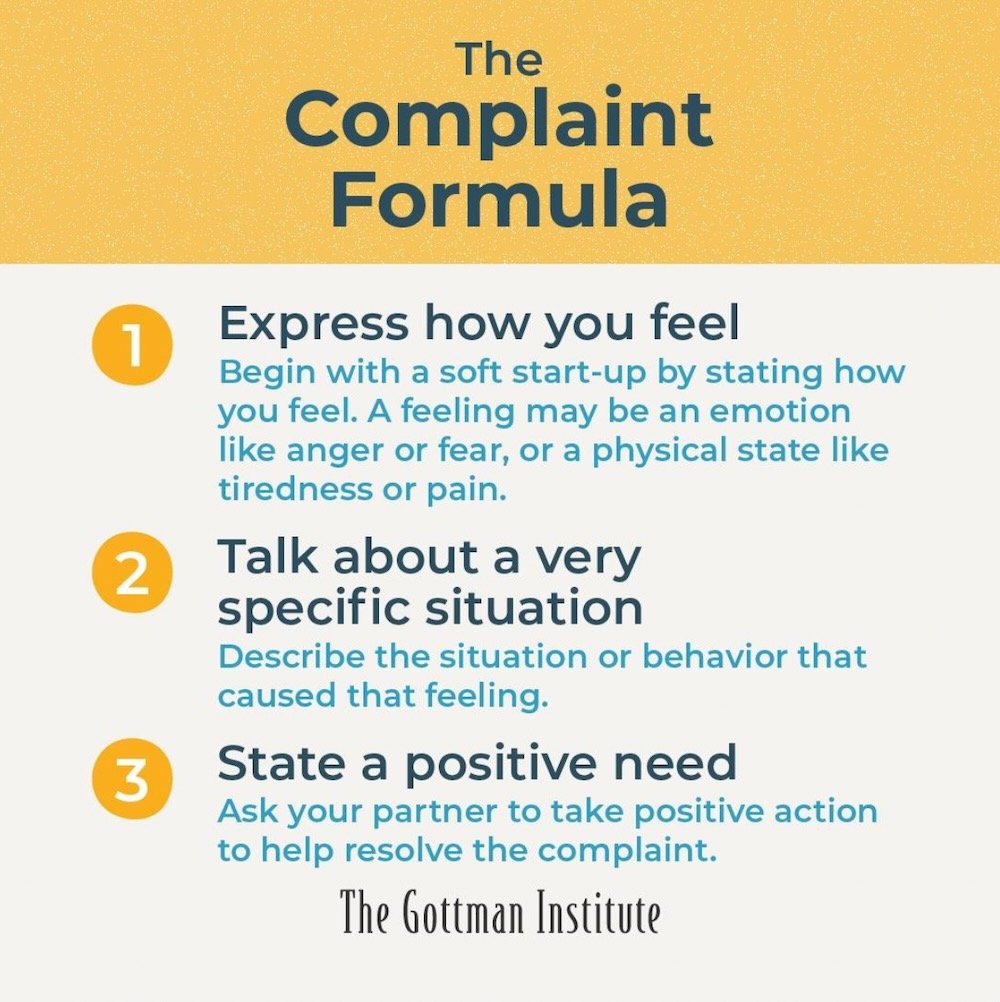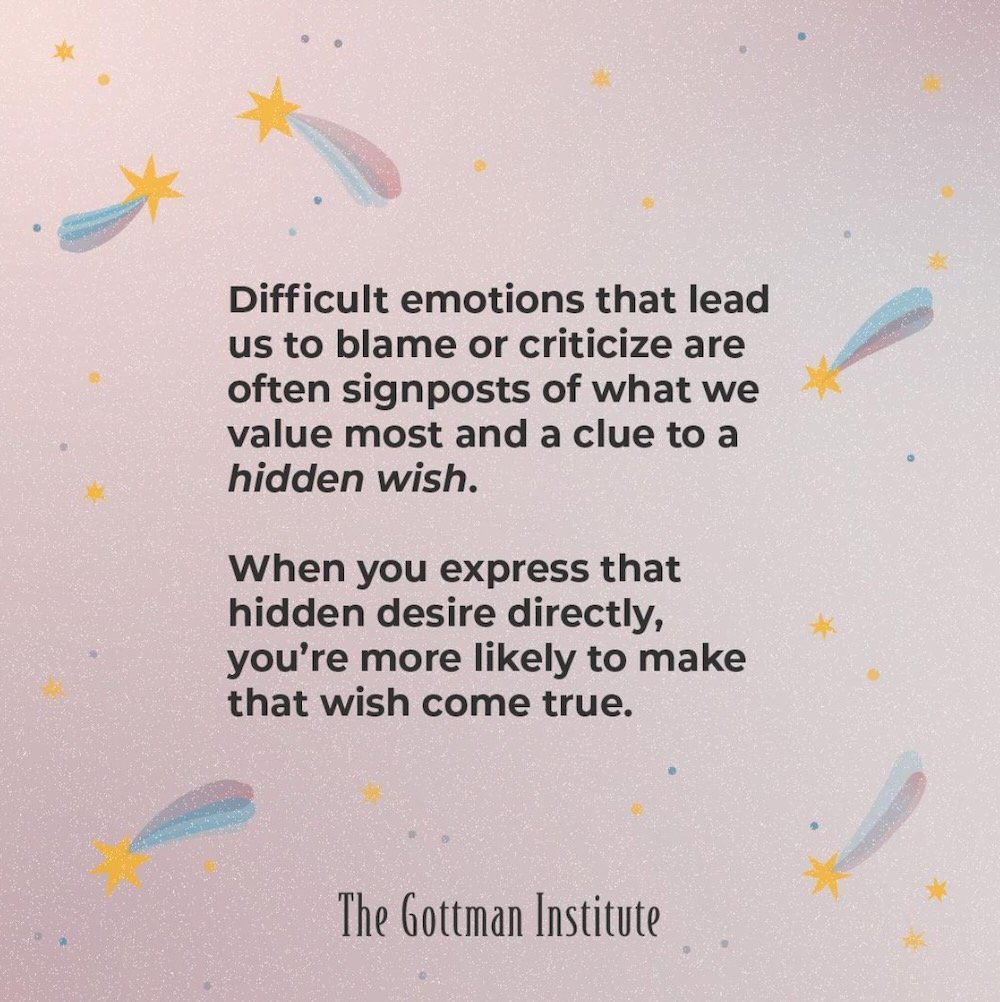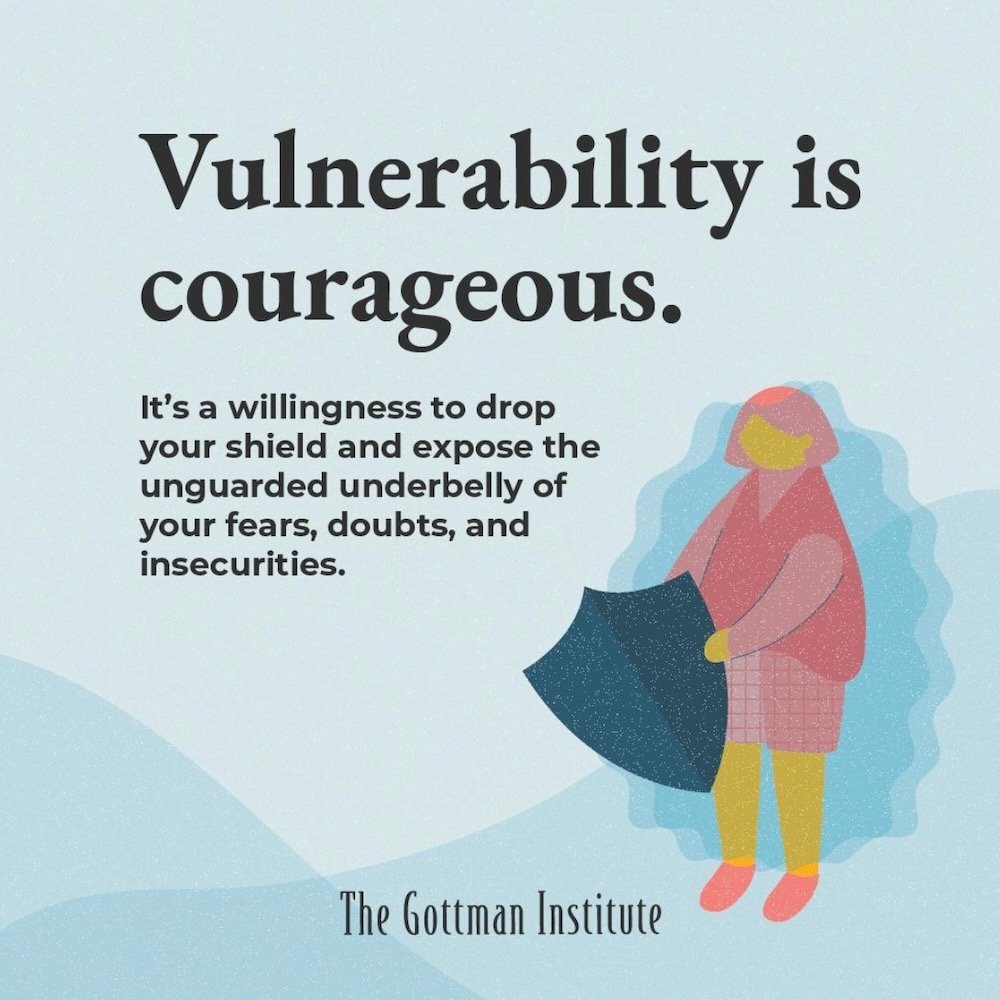Before You Complain To Your Partner, Try This Instead. (It Actually Works)
by Carolyn Firestone
Being in a couple can feel like you’re always on the tail end of asking your partner to do something or being asked to do something by your partner.
To the outside world, this may sound like teamwork. To the couple, it can feel more like war.
Researchers at The Gottman Institute have long been looking into why these interactions can become such a point of contention between couples.
What they’ve found is that many people have a tendency to come into these exchanges ready to complain, criticize, nitpick, or correct - all those prickly things that ignite tensions or lead to a full-on battle.
However, they also uncovered a highly effective way to break this dynamic.
We spoke to Certified Gottman Couples Therapist, Kimberly Panganiban, who explained how expressing something called “positive needs” can lead to incredibly improved outcomes between couples.
What are positive needs?
A positive need is something very “specific, clean, and concrete” that your partner can do to support you, said Panganiban.
People have a tendency to get frustrated and express their needs in negative ways that can be heard critically by their partner.
Examples overheard in households across the world (or maybe just ours), include:
Stop leaving your clothes on the floor.
You never give me your full attention.
Why are you always late?
You didn’t remember to stop by the pharmacy/ market/ dry cleaners, etc.
You haven’t asked me how I feel about that decision.
“When you’re always saying what you don’t like, you’re basically saying your partner is doing something wrong,” said Panganiban. “It’s very externally focused, and there’s not a lot of vulnerability.”
The solution is to think about what you’re really asking. What could the other person be doing to support you?
So, instead of the above statements, which read much like complaints, you might say:
I need you to make sure your clothes are picked up.
I need to feel like you’re hearing what I say.
I need you to be considerate of time when we do things together.
I need to be able to rely on you to help with errands.
I need you to ask me about my feelings before you make decisions.
How do we communicate our positive needs?
Expressing a positive need is about much more than semantics. “We’re not looking for people to just say something differently,” said Panganiban. “We’re looking for them to think differently.”
Coming to know your own, underlying needs can be a more complex task than simply yelling at your spouse to, “for the love of God, stop talking over me all the time!”
Because it’s a sensitive process, it’s broken down into two steps:
Step 1: Identify what you need.
Panganiban sometimes asks people, “If you had a magic wand and could instantly make everything the way you want it, what would that look like?”
Rather than looking outward for all that feels wrong, look inward for what would make it feel right.
Step 2: Express your needs to your partner.
How partners approach each other has a heavy effect on the outcome of the conversation, which is why Gottman-trained therapists recommend a “gentle startup,” a way of communicating concerns without placing blame.”
“Anytime you’re describing your partner, we consider that criticism,” said Panganiban. “When you’re talking about yourself, it comes from a place of vulnerability.”
Putting yourself into the equation by starting with a first-person or “I” statement helps establish that this isn’t just another demand or complaint you’re directing at your partner. Rather, you’re letting them know how you can feel more supported.
One example that illustrates this is that of a couple going to a party, where one person is more introverted and the other is more comfortable socially. While the introvert prefers to stick close to their partner, the extrovert likes to move independently through the room, chatting with others.
When addressing this issue, the shyer of the two might say something like, “Whenever we go to these parties, you’re always talking to everyone else. You don’t even want to spend time with me.”
A better approach would be to start with a positive need. The Gottman Institute recommends people frame their statement as follows:
“I feel ____and what I needs is_____.”
So, in the above case, the introvert might say “I feel worried that tonight I’m going to feel left out, and what I need is for you to stick with me at the party.”
This reframing “changes the whole interaction,” said Panganiban. “People are often surprised at how it can really deescalate things.” Their partner will soften to the request, because they feel the vulnerability behind it.
This way of opening up a dialogue dramatically increases your chance of getting the outcome you desire: a partner who is willing and wanting to meet your need..
Image from Instagram/ @gottmaninstitute
Why is it hard for people to connect with their needs?
If all of this feels easier said than done, the reasons may have to do with a person’s own struggle to be vulnerable around their needs. They may be afraid that their partner won’t really hear them or will react negatively, which could feel very painful, according to Panganiban.
Additionally, as John Gottman famously said, “Behind every complaint there is a deep personal longing.” When people explore their own needs with real curiosity and consideration, they can start to tap into that deeper longing.
This may not happen all at once. In the beginning, people might be more in touch with surface level needs, which can still be shrouded in some anger or dissatisfaction with their partner.
However, when they “drop down to that deep longing,” something that’s “so core” and reflective of what they really want or need, they may begin to feel hurt and pain about that need not being met much earlier in their life.
Because those needs weren’t met (oftentimes in childhood), they learned to shut them down or convince themselves they don’t need things as natural as to be loved or accepted.
Yet, what Panganiban and the team at Gottman want people to know is that hitting on that deep longing is actually the very element that “really shifts things with your partner.” Instead of, at best, just following instructions or, at worst, arguing over every little thing, your partner finally gets “why something is so important to you and wants to be there for you.”
Image from Instagram/ @gottmaninstitute
It’s really easy for people to miss the mark, as Panganiban put it when “they don’t really know what the mark is.” Stating positive needs gives couples the best chance to show up for each other in the ways that matter most.
Carolyn is the Managing Editor of The Candidly. Her favorite thing to do is to write about her favorite things, especially when they have even the slightest chance of making someone else’s something (mood, relationship, travel plans, or toiletry kit) a little better. You can find more of her articles here.
This article is for informational purposes only. It is not intended to be used in place of professional advice, medical treatment, or professional care in any way. This article is not intended to be and should not be a substitute for professional care, advice or treatment. Please consult with your physician or healthcare provider before changing any health regimen. This article is not intended to diagnose, treat, or prevent disease of any kind. Read our Terms & Conditions and Privacy Policy.











